- Home
- Chris Wraight
Wrath of Iron Page 8
Wrath of Iron Read online
Page 8
They were excited, rapt by the sight of the divine engine grinding into animation. He was excited too, as excited as he ever was when the long dormant periods were over and he could take his place back on the field of battle, clamped and plugged into the helm of a towering, semi-sentient god-machine.
Such excitement was dangerous. Getting lost in the bellicose soul of a war engine was always possible, and the wise princeps knew when to maintain his distance.
But Lopi was also wise enough to know when he could allow himself a little slack. Such moments were the compensation for every sacrifice he’d ever made, and a reminder of what joy, what transcendent bliss, was possible in the service of the Omnissiah.
Heriat strode across the apron, and the ash-heavy air swirled around his long synthleather coat. He would have been more comfortable wearing a rebreather but had eschewed such visible signs of weakness: the men needed to know that their commissars were suffering alongside them.
He forced down a cough as he breathed in more of the foul air. His throat had been inflamed and sore ever since planetfall, which was something he welcomed. Skietica – the condition that would eventually kill him – had symptoms of anaesthesia in its final stages, so the fact that he was capable of feeling pain meant that he was also capable of living.
That was a good motto. Perhaps he should find a way to weave that into one of his addresses to the troops.
Since the first landings, the Guard’s Helat base of operations had grown into a sprawling city in its own right. Barracks and hangars had sprung up in every direction. Defence towers dotted the landscape, each crowned with a knot of multi-barrelled AA weapons. A perimeter fence had gone up, crested with razor-wire and interrupted at thirty-metre intervals with infantry-shredding auto-
cannon stations.
Seven separate airfields operated throughout Shardenus’s twenty-one-hour diurnal cycle. Four of them were devoted purely to cumbersome supply lifters moving between the fleet in orbit and the forces on the ground. The remaining three had been reserved for military aircraft, and were crowded with Valkyrie and Vulture gunships, arranged wing-tip to wing-tip along kilometres of rockcrete apron.
Heriat strode past rows of Valkyries, observing their state and weapon patterns carefully. Each flyer had a crew of servitors attending to it, working tirelessly and silently on the laborious tasks of refuelling, systems checking and missile loading. The noise of their main-drive engines idling already made the ground vibrate; when they geared up for lift-off, the din would be deafening.
The lines of Valkyries extended as far as he could see, and the far end was eventually lost in the haze of ash. Placed together, such massed firepower looked close to invincible, and Heriat felt a brief flush of martial pride in what had been assembled.
The feeling didn’t last long. He also knew how formidable the hive defences were. Shardenus Prime had stood for several thousand years and seen off several significant threats in that time, so the architects of its defences had had plenty of time to learn their business.
He approached the waiting ranks of Harakoni Warhawks, making the sign of the aquila as he did so.
They stood in ranks four deep, wearing the armour that would take them into combat. The pilots wore standard black fatigues with open-faced helmets and minimal blast-protection. The drop-troops had been kitted out in full carapace armour. Their helmets were ungainly from rebreathers and armoured lens-arrays, and they carried heavy grav-chutes on their backs.
As Heriat drew up before them they shouldered their weapons and stamped to attention. Their commander, Aikino, stood in front, similarly kitted out for the attack run. Somehow he’d managed to cram his dreadlocks into his helmet.
‘At ease,’ he ordered, saluting Aikino with a clenched fist to the shoulder. His voice rang out across the apron, transmitted by tiny augmenter relays in his suit collar, and the troops complied instantly.
‘Soldiers of the Emperor,’ said Heriat calmly, not needing to shout to be heard. ‘I envy you. You are honoured with the first strike of this glorious campaign. Of all the many regiments of the Imperium present on this world, it is the Warhawks who will carry the fight to the enemy.’
As he spoke, he watched for subtle signs of fear from the men. None were apparent; they stood tall, unmoving, listening intently.
‘You know your task,’ said Heriat, picking out men at random and fixing them with a level stare. ‘Break the walls, create a breach for the others to come through. Such work is dangerous: some of you will not return. You are seasoned veterans, an elite among Guard regiments, and so we trust you. Your comrades in the Ferik Tactical and Galamoth Armoured and the skitarii of Astorum trust you. Without this spearhead, their assault cannot succeed.’
Heriat didn’t mention the Iron Hands; it would have been pointless to do so. He began to pace in front of them, casting his discriminating eye over the ranks, looking for waverers.
None yet.
‘You all have your battle-plans. As we speak, our cells within the hives have been activated and the defence towers are under attack from within. Galamoth artillery trains have been brought forward and will advance in your wake. The storm will strike you hardest, and you must rise to meet its challenge, but you will not be alone.’
Heriat allowed his voice to rise; to strengthen, to encourage. He was capable of fearsome levels of intimidation when the occasion demanded it, but this was not one of those times.
‘The Emperor will be with you,’ he said, channelling his own devotion and trusting that the men before him shared his faith. ‘Those who die will be martyrs, and those who live will be heroes. Accomplish this, and this world will return to the ranks of the faithful, to the greater glory of the eternal Imperium of Mankind.’
He stood back and raised his fist to the sky.
‘Ave Imperator!’ he shouted.
Ave Imperator! came the massed response, a roar of hundreds of men muffled behind masks and visors.
‘Death to the heretic!’
Death to the heretic!
‘Harakonari an tellika refala!’
The last sentence was in Konndar, the dominant dialect on Harakon. Heriat wasn’t exactly sure what it meant, but had been assured by his ethnographic staff in the Commissariat that it was suitably rousing. Something to do with loyal spouses at home.
Tellika refala! they roared with real enthusiasm.
Then Heriat turned to Aikino and gave him a curt nod.
‘That is all, colonel,’ he said. ‘Take your stations.’
Aikino returned the nod.
‘They’ll fight well, commissar,’ he said.
Heriat paused.
‘What I just said.’
‘Sir?’
‘It didn’t mean what I thought it did, did it?’
Aikino smiled.
‘I doubt it. Do you want to know what you told them?’
Heriat considered it.
‘No.’
From somewhere under Aikino’s helmet came a rebreather-filtered laugh. It was a gritty laugh, full of the sardonic resignation of a career soldier.
‘For the Emperor, Commissar-General,’ said Aikino, clasping his fist against his breastplate.
Behind him, the Valkyries’ engines began to whine up to full power. The Warhawks broke ranks, team by team, and jogged over to their aircraft. For them at least, the waiting was over.
‘For the Emperor,’ said Heriat, returning the salute and wishing he had Thunderhawks to send into combat alongside them. ‘In His name, bring them pain.’
‘For the Emperor,’ said Marivo, plunging the handle down and watching the service doors slide open. ‘Move fast, follow my lead.’
Then he set off, keeping his head low. His bre
athing echoed noisily in his enclosed helmet, made worse by the filtration apparatus lodged below the visor. The armour Valien had sourced was cumbersome, made clumsier by its extra blast-cladding and stringent environment filters.
He ran out from the open service entrance and down a long ramp. A labyrinth of long-disused buildings extended out ahead of him, all of them intersected with hissing iron pipework and cabling. The open sky yawned away above his head, and for a moment the sudden absence of covering made him feel ill. Marivo swallowed, going through the routines that warded sky sickness.
Behind him came the rest of his squad: twenty of them, most of them Guard troopers from his own regiment, some gangers, a couple of junior arbitrators. Khadi was among them somewhere, though he had no idea where; the soldiers of the squad all looked same in their sealed armour.
They had broken out of Melamar Secundus hive at ground level. Marivo had never gone so far down before, and he had to admit that Khadi’s expertise in the claustrophobic, sewage-clogged underhive tunnels had been invaluable. Behind them, the spire’s huge bulk reared away skywards.
The air of the wasteland hit him like he’d run into a wall. It was thick with a foul miasma of industrial pollutants, powerful even through his helmet’s filters – a mix of sulphur, spent promethium and metallic corrosion. Visibility was no more than twenty metres or so, and everything he could see was wreathed in a haze of dirty browns and greens.
‘Keep close!’ he hissed again over the vox.
A quick look over his shoulder confirmed what he’d suspected: some of his men were managing their heavy las-packs well and running well; others, the civilians no doubt, were already struggling to keep up.
Holy Terra, he swore to himself. We’ll be lucky to make it there at all.
He swung back round, feeling the cables looping under his firearm slowing his movements. His boots struck the broken tarmac awkwardly as he ran and his breathing sounded hoarse and ragged in his earpiece. His head began to ache, and a bitter, chemical taste lodged at the back of his throat.
The defence tower wasn’t far – less than a kilometre if they went efficiently – but the disused ground between it and the Melamar spire was like a maze and strewn with half-hidden obstacles. The roads that had once existed were choked with refuse and slimy with pools of glowing liquid. Marivo skirted around a huge pipe housing and jogged down a long alleyway, flanked on either side by long-abandoned power generators.
As he went he recalled the route he’d worked out with Valien, running through the turns and switchbacks in his mind. The elevated transit tube – the route any sane person would have taken, if it hadn’t been so heavily guarded – would be coming up shortly, and he looked up, hoping to catch site of the reinforced corridor above them. His eyes watered as he did so, and a blur of nausea washed over him.
A huge flash of red lit up the sky, running from the perimeter walls up into the cloud cover. A rolling, grinding boom followed on, making the clouds of pollution shake and disperse. The ground trembled.
Some of Marivo’s men lost their footing and fell into the slime below, cursing and coughing.
‘What was that?’ came Khadi’s voice over the vox. She sounded both terrified and nauseous.
Another boom echoed out, followed by several smaller explosions.
‘The wall guns,’ said Marivo grimly. ‘It’s started.’
He grabbed the shoulder guard of a man who’d fallen.
‘Keep going,’ he said, dragging him to his feet and kicking him back into a run. ‘They’re not aiming at us. We have to keep moving.’
He hoisted his gun back into firing position and resumed his own run. The sound of the hive cluster’s defence grid opening up above them was disorientating. More explosions followed, seemingly from every direction, and the sky stayed red.
Then, at last, he saw the transit tube above him. It flew across the tangled mess of the wasteland, twenty metres up into the murk of the smoggy sky. The tube itself was at least seven metres in diameter and ringed with re-inforcing bands of adamantium. It was far out of reach, and too strong to be damaged by small-arms fire.
‘That’s it,’ he said. ‘We follow that line.’
He ran along the route of the transit tube above him, using its bulk to shield the squad from prying eyes above. More industrial units passed by in the fog of contamination around them, all of them derelict and gradually sinking into the acid-drenched earth around them. He heard his breathing get even worse, and the pain behind his eyes turned from a throb into a sharp stab.
He heard Khadi’s words echo in his mind.
Rebreathers? They’ll clog before we get halfway.
He kept running, trying to ignore the burn, keeping his head down and drawing breaths as sparsely as he could manage. His squad came with him, stringing out as they struggled with the atmosphere.
It took longer than he’d imagined it would, but eventually the defence tower loomed up out of the murk. It soared hundreds of metres up into the sky, blunt and angular, clad in plates of thick armour and crowned with a brace of lascannons. The tower had been built into the huge perimeter wall, which curved upwards away from them into the night.
Marivo skidded to a halt, sweeping his lasgun around in search of targets. His squad did the same, drawing deep, wheezing breaths. A few of them fell to their knees, struggling to inhale.
‘Get up!’ Marivo ordered, strapping his weapon to his armoured thigh and taking a melta charge from his belt. ‘Stay on your feet or you’ll never get up again.’
His men organised themselves into a semicircle at the base of the tower, facing outwards and aiming their weapons nervously. Nothing moved in the wasteland around them, but the barrage over the walls above intensified, filling the air with the crackle and spit of cannon discharge.
Like many of the structures within the hive cluster, the base of the tower was too polluted to be used regularly; the inhabited levels were all higher up. The armour plating near the ground was corroded and cracked, just as Valien had informed them. The agent had also assured them that he’d weakened an old service hatch during his last infiltration, and that meltas would be more than sufficient to blow a way in.
You’d better have been right about that.
Marivo ran his auspex over the tower’s foundations, searching for the trace signal left at the required position. His head was hammering by then, and his throat felt like he’d swallowed a handful of iron shavings.
‘I have it,’ he growled over the vox, sounding more like an animal than a man. ‘Ten seconds, on my mark.’
His squad withdrew away from the tower’s base. Marivo set the timer on the charge, and clamped it against the outer lip of the service hatch. Once done, Marivo and the others retreated clumsily, tripping over their own feet as the effects of the toxins increased.
Marivo saw the timer count down in his wrist chrono in a series of blurry outlines. Once it reached the limit, he crouched down on his haunches, covering his head.
A thick crump bloomed out through the air, barely audible over the rumble of ordnance erupting further up the walls.
‘Let’s go!’ Marivo cried then, leaping back up to his feet and breaking into a run. This was it. ‘Go!’
Aikino hooked himself to the rail running along the ceiling of the Valkyrie’s crew-bay. The metal around him hammered from the cycling-up engines, filling the air with a dense wall of white noise.
‘Get in!’ he roared over the comm, watching as the rest of his squad ran up the rear ramp and shackled themselves into position. They pushed past him and shuffled further down the bay, leaving him in the position of first-jump, just the way he liked it. All of them were kitted for the drop, with their lasguns strapped across their chests and grav-chutes clamped to their backs. ‘Go, go, go!’
The pilot of Valkyrie assault carrier TV-782, known to its crew by the daubed scrawl of Kelemak Queen
below the cockpit, triggered an acknowledgement rune on the crew-bay ceiling and gunned the VTOL engines into life. The gunship lurched into the air, cushioned on a raging layer of engine-wash. The noise level in the crew-bay reached new heights, shaking the rivets in the panels.
Aikino looked out of the open ramp as the gunship slowly gained altitude. He saw the apron shrink below him. Other Valkyries were already airborne, turning around on columns of smoky downdraft before dipping their noses and thrusting off into attack runs. He counted more then twelve of them in the air before the rear ramp began to close and obscured his view.
Aikino leaned back against the pressed-metal wall and activated a comm-link to the pilot.
‘Get us in front,’ he said over the crackling feed. He could hardly hear himself speak. His heart was thudding strongly, and he could almost feel the adrenaline pumping around his system. ‘I want to be first.’
‘Yes, sir,’ came the reply from the cockpit, and a huge thrum blew up from under the Valkyrie. Aikino felt the switch from thrusters to aerial drives, and the aircraft tilted into its attack position.
‘This is it!’ he roared, addressing the other soldiers crammed up against him in the shaking crew-bay. His voice sounded tinny from inside his blast helmet. ‘Fifteen minutes to target! Check your weapon! Check your chute! On my word, follow me down!’
The men ran their checks, just as they had done on the ground, and just as they had done a dozen times beforehand in the hangar. They swayed with the rolling movement of the gunship as it accelerated, barely needing the support of their shackles. Their movements were tense but unpanicked – they were Warhawks, as at home in the air as they were on the ground.
Aikino looked down at his own weapon, a short-stocked lasgun with the words retalla mire allek scratched along the charge casing.
‘Kill or be killed,’ he mouthed, speaking the words in Gothic. ‘Can’t come quickly enough.’

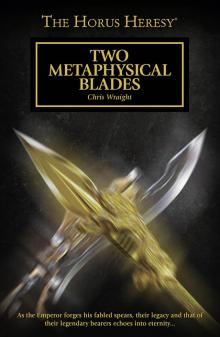 Two Metaphysical Blades
Two Metaphysical Blades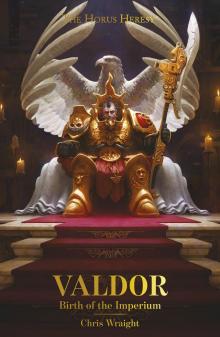 Valdor: Birth of the Imperium
Valdor: Birth of the Imperium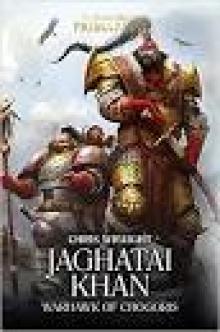 JAGHATAI KHAN WARHAWK OF CHOGORIS
JAGHATAI KHAN WARHAWK OF CHOGORIS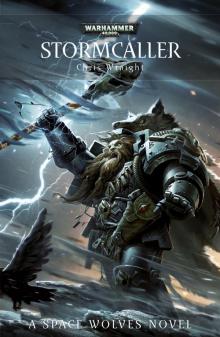 Stormcaller
Stormcaller Child of Chaos
Child of Chaos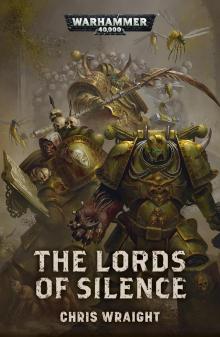 The Lords of Silence
The Lords of Silence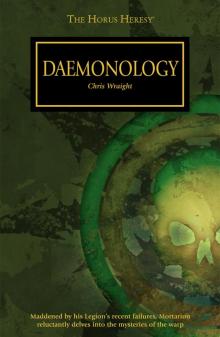 Daemonology
Daemonology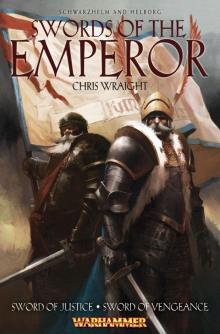 Swords of the Emperor
Swords of the Emperor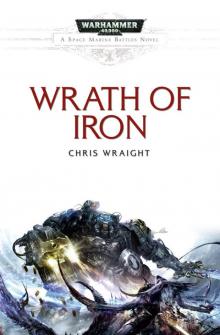 Wrath of Iron
Wrath of Iron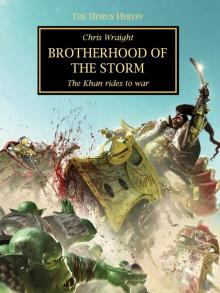 Brothers of the Storm
Brothers of the Storm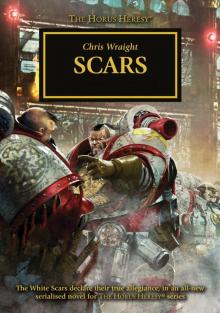 Horus Heresy: Scars
Horus Heresy: Scars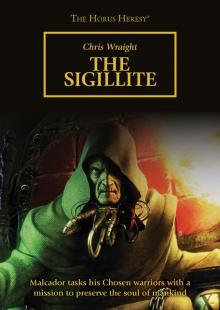 The Sigillite
The Sigillite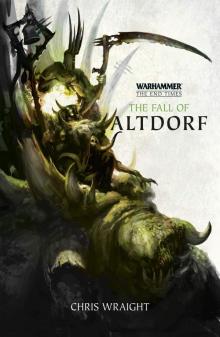 The End Times | The Fall of Altdorf
The End Times | The Fall of Altdorf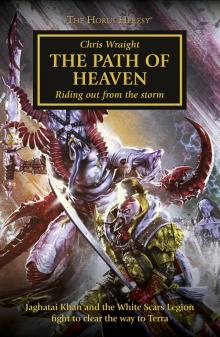 The Path of Heaven
The Path of Heaven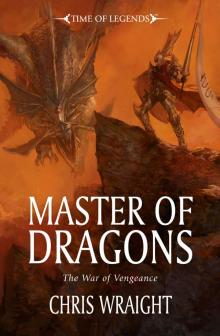 Master of Dragons
Master of Dragons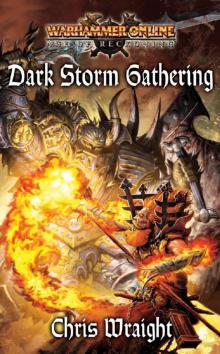 WH-Warhammer Online-Age of Reckoning 02(R)-Dark Storm Gathering
WH-Warhammer Online-Age of Reckoning 02(R)-Dark Storm Gathering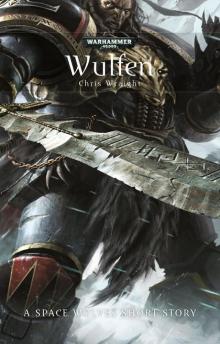 Wulfen
Wulfen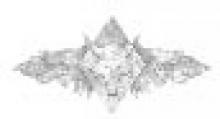 Battle Of The Fang
Battle Of The Fang Onyx
Onyx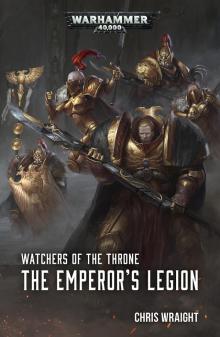 Watchers of the Throne: The Emperor’s Legion
Watchers of the Throne: The Emperor’s Legion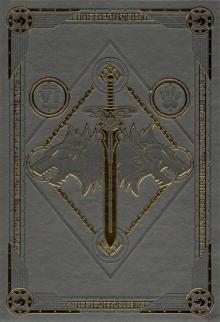 Leman Russ: The Great Wolf
Leman Russ: The Great Wolf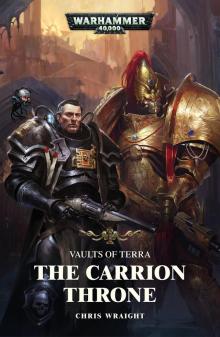 Vaults of Terra: The Carrion Throne
Vaults of Terra: The Carrion Throne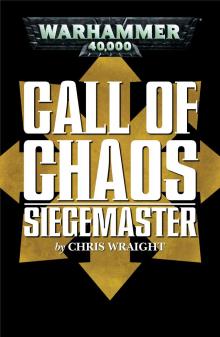 Siegemaster
Siegemaster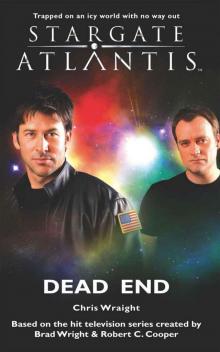 STARGATE ATLANTIS: Dead End
STARGATE ATLANTIS: Dead End Scars
Scars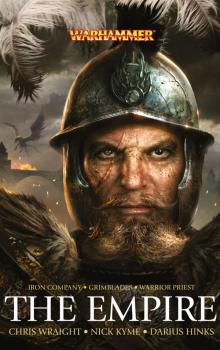 The Empire Omnibus
The Empire Omnibus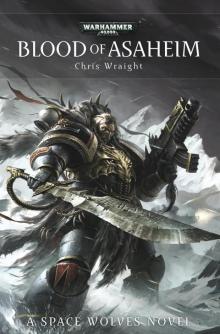 Blood of Asaheim
Blood of Asaheim